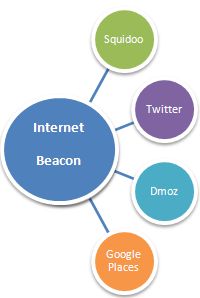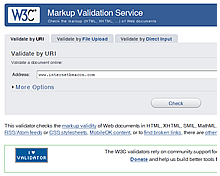Posts Tagged ‘search engines’
Description of ‘search engines’ Tag:
Friday, September 16th, 2011
Constructing a website for a business is only the first part of attracting your online customers. There are many factors that determine your position on the search engine results page, one of them being the quality and quantity of your inbound links. In order to increase traffic and gain a good web rank your website should have a significant amount of backlinks. These backlinks should connect with valuable, authoritative, and industry related websites. Gathering backlinks should be a top SEO priority because without them it can be extremely hard to move up in the search engine results or generate more website visibility.
There are a number of ways to build backlinks to your webpages, one of which we mentioned in our previous blog entry, “Reciprocal Linking”. Reciprocal or two way linking is when two websites agree to exchange links with each other. However linking doesn’t always have to be mutual, this type of linking is called one way linking. The following list provides some popular sources and methods of obtaining one way links.
Create Superior Content and Resources:
In addition to creating a visually appealing and easy to use website you will also need to have high quality content or linkbait to draw the attention of visitors. This content is used to influence visitors to link back to your website by sharing your content. When other websites share your content on their website they will typically link back to the original source.
- Create 101 articles that describe the basics of your industry related subject.
- Create Top 10 or 100 lists.
- Lists the top professionals from your industry.
- Create an infographic that displays industry information in an intriguing and exciting way.
- Create free helpful online tools or downloadable software programs.
Start a Blog:
A blog is a handy instrument when it comes to gaining momentum and popularity over the Internet. A Blog has many benefits for example it is an excellent way to reach existing clients and find new… Read the rest
Tags: backlinks, blog, content, inbound links, Links, search engines, Social Media
Posted in Backlinks, Internet Marketing, Search Engine Optimization SEO | 2 Comments »
Thursday, April 28th, 2011
Does code validation really matter and if so to whom does it matter to, a website visitor, a search engine, both? Not everyone thinks that code validations are all that important and feel that search engines do not consider validation when ranking a website. Regardless of the impact that code validation has on a websites ranking, both sides of this discussion can agree that code validation is useful for a number of other reasons.

http://validator.w3.org/
Code validation is the process of inspecting and amending the code or your web documents. This is done by comparing the code to formal standards like those established by the World Wide Web Consortium (W3C). The W3C is the main international standards organization for the Internet. This organization offers a markup validation service to check HTML documents for errors and ensures that they are in accordance with their standards. To fully validate a websites code two separate assessments need to be performed, one for the HTML or XHTML and another for the Cascading Style Sheets (CSS). Although a number of programs like XHTML-CSS offer code validation services that are based on the standards set forth by the W3C it might be best to use the actual html validator and css validator provided by the World Wide Web Consortium.
Getting back to why it is important to validate your code regardless of how it impacts the page rank, of the many reasons for validation there are 6 fundamental reasons why it should be done.
Debugging and Maintenance:
HTML and CSS validation works similarly to a spell checker by locating errors found throughout your web documents. During the validation process errors are identified and documented so that a user can easily fix them.
Learning and Prevention:
As the validation process identifies common errors you can learn from your mistake and therefore prevent the… Read the rest
Tags: browser, code, errors, html validation, search engines, standards, validation, W3C, World Wide Web Consortium
Posted in Search Engine Optimization SEO, Web Development, Web Tips | No Comments »
Thursday, August 12th, 2010
Hey, Josh here from the InternetBeacon.
Google, as we all know, is powered by advertising. It hardly makes sense to be in the search engine biz unless you can make a little money. Well, Google makes a lot of money. A large part of how they do that is a program called AdWords. AdWords is a marketing tool that allows you to design custom ads that will appear alongside search results from the Google engine. Let’s take a look at how it works.
First, you tell Google what kind of ad you want to post. For our purposes, let’s say simple text. Rather than making you go through an elaborate process, they have a simple, fill-in field system that lets you describe what you are advertising. Formatting and the like are all taken care of by Google. Part of this is determining the keywords you want to use for this ad. This will tell Google when to display your ads. If you aren’t keen on using text only, you can also opt for image ads using their web-based software.
As far as paying for these ads goes, it’s pretty simple. These ads are what we call Pay-Per-Click. This means that you only pay when someone using Google actually clicks on your website’s ad. You can set how much you are willing to pay as well as how much your budget is for that day. This keeps you from racking up a huge bill without noticing.
AdWords is a successful part of the Google brand. For those looking to get started marketing their business or for those who want to expand their reach, AdWords is worth a look.
More info on SEO, check out our SEO Answers page, our SEO Glossary, and our blog posts on SEO.
-Josh
Internet Beacon

Tags: ads, AdWords, Google, marketing, search engines, seo
Posted in Internet Marketing, Marketing Plan, Search Engine Optimization SEO | 2 Comments »
Thursday, June 3rd, 2010
 Howdy, Josh here from the Internet Beacon. We´re a Search Engine Optimization (SEO) firm located in Reisterstown, Maryland. What we do, SEO, is a subcategory of Internet Marketing. Similar to traditional advertising, SEO is all about getting your Brand out there. In this case, we´re working to get your website in front of customers through search engines like Google, Yahoo, and Bing. For more quick, useful information, check out our SEO Answers page, our SEO Glossary, and our blog posts on SEO. Howdy, Josh here from the Internet Beacon. We´re a Search Engine Optimization (SEO) firm located in Reisterstown, Maryland. What we do, SEO, is a subcategory of Internet Marketing. Similar to traditional advertising, SEO is all about getting your Brand out there. In this case, we´re working to get your website in front of customers through search engines like Google, Yahoo, and Bing. For more quick, useful information, check out our SEO Answers page, our SEO Glossary, and our blog posts on SEO.
You´ve got a website. Congratulations! Now it´s time to put some content on there. You know that the more you have, the better your site will do online. This is a mixture of Google´s PageRank system, pages indexed by sites like Yahoo! and Alexa, as well as the actual content on your page. This is where a lot of people are tempted to build giant sites that are really just the same page or two duplicated over and over again. This is a terrible idea.
There are many reasons why you should not simply bombard a web server with the same pages. First, no one is going to like your website. I know that search engines are important, but they are not the be-all/end-all of the Internet. The fact of the matter is, PEOPLE are going to look at your website. If they hate it because it´s 1,000 page of the same thing, no one will ever come back. In fact, they´ll likely tell their friends to steer clear of your site.
Second, search engines are not stupid. Think about it. You´re relying on software to make your website more popular; do you think they don´t know what´s going on? I can answer that: they do. Google, like all search engines, searches the text on your page. Therefore, they have checks in place to make sure that your content is not duplicated. Avoid duplication when building your site. The big guys know what you´re up to.
That´s all for this week. Check back again next week for more tips on web development and SEO.
-Josh
Internet Beacon
SEO Maryland

Tags: content, engines, Google, internet, marketing, page, search, search engines, seo, site, website
Posted in Internet Marketing, Search Engine Optimization SEO | No Comments »
|
![]()